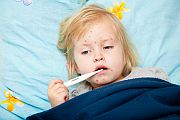
THURSDAY, May 7, 2015 (HealthDay News) — New research suggests that children who survive a measles infection remain vulnerable to other potentially deadly infections for as long as two or three years after the measles infection.
The finding is yet another reason for children to get vaccinated against measles, the researchers said.
A measles infection appears to wipe out the memory cells of a person’s immune system, which the body uses to recall how to fight off all the bad bugs encountered day-to-day, said study lead author Michael Mina, a postdoctoral infectious disease researcher at Princeton University.
Without that immune memory, children post-measles are at greater risk of contracting pneumonia, encephalitis and other infectious diseases. The measles even seems to wipe out immunity children gain from vaccines against other infectious diseases, Mina said.
However, due to the design of the study, the researchers could only find a link between measles infection and an increased risk of other infectious diseases. The study wasn’t able to prove a cause-and-effect relationship.
Still, Mina said it appears that after a measles infection, “[children] have to spend the next few years of their lives rebuilding their immune systems, and during that time they are at the mercy of other illnesses.”
These findings help explain why the introduction of measles vaccines has helped prevent larger numbers of deaths than can be attributed to measles alone, Mina said.
“It’s just one more level of evidence to show how important measles vaccination has been, in terms of global health,” he said. “No other public health intervention since piped water that has led to such reductions in childhood mortality.”
Results of the study were published in the May 8 issue of the journal Science.
An outbreak of measles this year in the United States sickened 147 people, including 131 in California. The outbreak began at two Disney theme parks in southern California, and was likely caused by unvaccinated individuals, health officials said.
Measles vaccination has been shown to reduce the childhood death rate in resource-poor countries by 30 percent to 50 percent, and by up to 90 percent in the most impoverished nations, researchers said in background information in the study.
To figure out why this occurs, Mina and his colleagues analyzed public health data from before and after mass measles vaccinations began in Denmark, England, Wales and the United States.
They verified that the childhood death rate in those countries did indeed fall by about 50 percent following the introduction of the measles vaccine, Mina said.
Further, they found that children in those countries who contracted and survived the measles were more likely to subsequently die from another infectious disease.
Prior studies have suggested that measles causes a short-term “immune amnesia” that lasts for weeks or months following infection. By looking across large populations, this study found that the immune suppression caused by measles appears to be deeper and longer lasting than previously thought, the study authors said.
Children’s immune systems in England and Wales appeared to be weakened for as long as 28 months following a measles infection, during which time they were at increased risk for death from a viral or bacterial disease, the study reported. In the United States, the effect lasted about 31 months, and in Denmark, about 26 months, the study said.
“These results provide population evidence for a generalized prolonged [roughly two- to three-year] impact of measles infection on subsequent mortality from other infectious diseases,” the authors concluded.
The effect appears specific to measles. The research team conducted a similar analysis on pertussis, the bacteria that causes whooping cough, and found no association between a country’s pertussis rate and subsequent childhood deaths due to other infectious diseases.
“Measles specifically targets immune memory cells, while other viruses target a broad array of cells,” Mina said.
Infectious-disease experts said the new study highlights the need to have children vaccinated against measles, given that the disease can have such a profound effect on a child’s immunity.
“This really does emphasize the importance of vaccination more than ever,” said Dr. Henry Bernstein, a pediatrician with North Shore-LIJ Health System in New Hyde Park, N.Y. “With 20 million cases of measles each year, there’s no question it would be ideal to get as many people as possible vaccinated around the world.”
Another expert said he’s seeing more cases of measles due to parents withholding their children from vaccination.
“These parents are misinformed about the adverse effects of the vaccine, and do not understand the devastating impact that measles can have on a child’s long-term health,” said Dr. William Schaffner, an infectious diseases specialist at Vanderbilt University School of Medicine in Nashville.
Mina agreed. “The underlying bad effects of measles are more than meets the eye,” he said. “There’s this misperception that measles is some benign infection. Our data really suggest that under the hood there’s this much more devastating effect.”
Dr. Bruce Hirsch, an infectious diseases specialist at North Shore University Hospital in Manhasset, N.Y., said he’s pleased that the study uncovered side effects from the measles vaccine that are actually positive and beneficial.
“With any treatment, we’re worried about adverse side effects,” Hirsch said. “For me as a treating doctor, to see there are unintended benefits is kind of gratifying.”
More information
For more on measles, visit the U.S. Centers for Disease Control and Prevention.
Copyright © 2026 HealthDay. All rights reserved.

